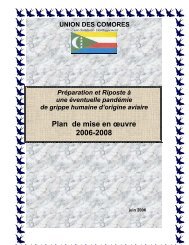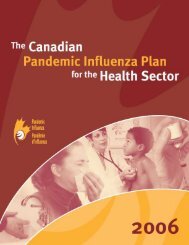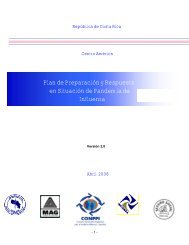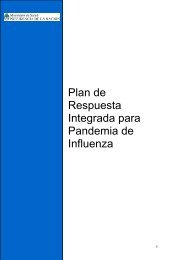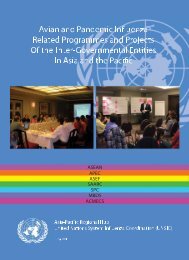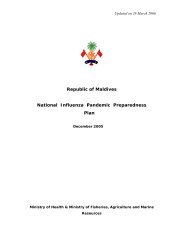GES Simulation Guide v3.pdf - Avian Influenza and the Pandemic ...
GES Simulation Guide v3.pdf - Avian Influenza and the Pandemic ...
GES Simulation Guide v3.pdf - Avian Influenza and the Pandemic ...
You also want an ePaper? Increase the reach of your titles
YUMPU automatically turns print PDFs into web optimized ePapers that Google loves.
PREPARATION OVERVIEW | Pg 15 PREPARATION OVERVIEW | Pg 16<br />
PREPARATION OVERVIEW<br />
Activities covered in this section include <strong>the</strong> following:<br />
Activity / Task<br />
Obtain governmental support <strong>and</strong> approval through<br />
a governmental lead person (possibly senior<br />
minister).<br />
Organise facilitation team.<br />
Develop a technical working group including a<br />
Technical Focal Point <strong>and</strong> agree on dates, scenario,<br />
<strong>and</strong> processes. Appoint an Event Coordinator.<br />
Event Coordinator to develop links with ministerial<br />
bodies, regional organisations <strong>and</strong> international<br />
groups.<br />
Invite participants.<br />
Adapt <strong>GES</strong> materials.<br />
Arrange for external participants & role-playing.<br />
Prepare <strong>GES</strong> venues, equipment, supplies.<br />
Assign facilitator tasks.<br />
Install e-mail messages on SAC computer.<br />
Provide governmental lead with “last-minute”<br />
instructions.<br />
Weeks before <strong>GES</strong> event<br />
8 7 6 5 4 3 2 1<br />
This schedule takes into account some of <strong>the</strong> key steps <strong>and</strong> possible time lines<br />
when developing a simulation event. Some parts may take significantly longer,<br />
such as negotiating government support <strong>and</strong> attendance. Senior Government<br />
ministers <strong>and</strong> <strong>the</strong>ir deputies are likely to require at least three months advance<br />
notification in order to adjust <strong>the</strong>ir schedule to be able to attend. Some ministries<br />
may require detailed information in order to underst<strong>and</strong> <strong>the</strong> relevance of<br />
<strong>the</strong>ir attendance <strong>and</strong> this will take time to negotiate. Having senior level backing<br />
<strong>and</strong> a respected signature on <strong>the</strong> simulation documentation is very worthwhile<br />
<strong>and</strong> will avoid possible difficulties at later stages.<br />
Preparation is most important <strong>and</strong> takes considerable time. You may, however,<br />
find it necessary to conduct all tasks within a much shorter time as a simulation<br />
date may be set in advance. This can be done given good organisational skills<br />
<strong>and</strong> support. The facilitation team should be selected based on providing such<br />
support as organising such a simulation is a significant undertaking <strong>and</strong> should<br />
not be attempted alone.<br />
Refer to Annex A. on Page 41 for a detailed checklist of preparation tasks.<br />
ORGANISE<br />
FACILITATION TEAM<br />
COMPOSITION<br />
Each <strong>GES</strong> event should ideally have a minimum of four facilitators with one acting<br />
as lead facilitator. The facilitator can be a person from within <strong>the</strong> government<br />
with appropriate facilitation skills or in some cases an external facilitation team<br />
with experience in simulations may be engaged. However, some participants<br />
may not feel comfortable with external facilitators <strong>and</strong> this should be examined.<br />
This number enables <strong>the</strong> team to monitor participant assignments <strong>and</strong> to roleplay<br />
essential actors who are not physically part of <strong>the</strong> exercise. Facilitators should<br />
be selected on <strong>the</strong>ir organisational <strong>and</strong> preferably role playing skills <strong>and</strong> could<br />
come from any department. Strive for a gender balance in facilitators: planning,<br />
preparedness <strong>and</strong> response must be seen as <strong>the</strong> domain of both men <strong>and</strong> women.<br />
The lead facilitator should have prior experience running moderate to large<br />
simulations (preferably a <strong>GES</strong> event), <strong>and</strong>, ideally, <strong>the</strong> o<strong>the</strong>r members of <strong>the</strong><br />
facilitation team would have previous experience running a simulation exercise.<br />
For some staff members <strong>the</strong>ir technical knowledge will be key, whe<strong>the</strong>r that be of<br />
a particular location, National Disaster Management Office (NDMO) process or<br />
humanitarian sector. By having members from emergency organisations on <strong>the</strong><br />
facilitation team helps to ensure that <strong>the</strong> emergency relationships can be credibly<br />
represented during <strong>the</strong> exercise. Facilitators should have some real world<br />
expertise in roles <strong>the</strong>y are likely to play, for example, media organisations could<br />
be represented by a person from media liaison, international agencies represented<br />
by someone from <strong>the</strong> international or foreign affairs department. Consider also<br />
bringing in groups external to government, such as UN agencies or media bodies.


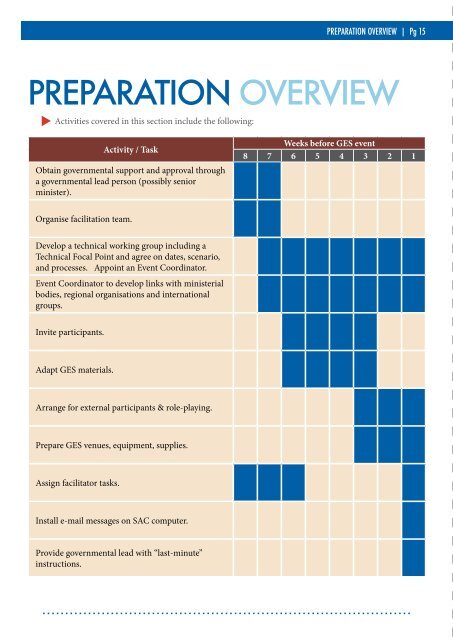
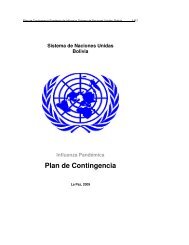
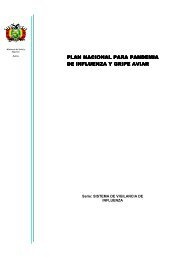
![Tanzania National Plan (January 2007)[1].pdf - Avian Influenza and ...](https://img.yumpu.com/36423433/1/190x245/tanzania-national-plan-january-20071pdf-avian-influenza-and-.jpg?quality=85)
